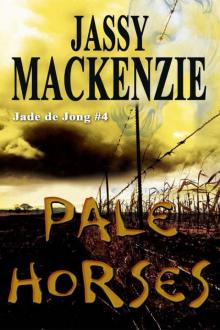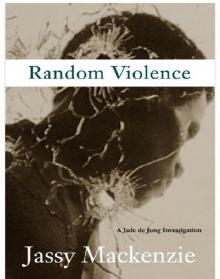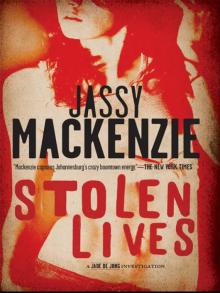- Home
- Jassy Mackenzie
Stolen Lives Page 4
Stolen Lives Read online
Page 4
Pamela was immobile, panting, white-faced and wide-eyed. Conscious, though, in spite of the knock her head had taken.
“Get out!” Jade fumbled to undo her seatbelt. “Now.”
The passenger door had buckled and she didn’t rate the chances of getting it open, so she leant over and half-pushed Pamela out of the car through the driver’s door. She was quivering all over, a delayed reaction to their predicament. Not a good state for accurate shooting if the gunman returned.
“My bag.” Pamela turned back to the car.
Jade grabbed the Gucci handbag and scooped the contents back inside it. Or those she could see, anyway.
Not surprisingly, the traffic had slowed to form a fascinated queue of rubberneckers goggling at the unusual sight of a one-car accident on a suburban verge.
The gunman could return at any moment. She was sure she could hear the distant blurt of his engine. If he did, they would have nowhere to go. They were sitting targets, as would be any well-meaning people who stopped to help. Already, Jade could see two concerned-looking motorists had pulled over onto the opposite verge.
Looking ahead, she saw the taxi that had been following them had stopped to let out a passenger.
“Quick!” Waving at the taxi driver, she set off at a run.
She jumped over the buckled sign—glancing down, Jade saw they had just entered the suburb of Birdhaven—and down onto the paved pedestrian walkway. Pamela flailed behind her, battling to keep up in her unsuitable footwear. She stumbled as her high heel twisted sideways on the bricks, and almost fell. Jade grabbed her hand and yanked her along without slowing down, and it occurred to her that from now on she should insist that clients with errant husbands wear sensible shoes at all times.
“Here.” They reached the taxi. “Get in.”
“Inside this?” Pamela stopped in her tracks, staring at the battered white minibus.
“Yes. Hurry.” Jade pushed her through the open door with more force than she’d intended.
The tinted windows made the taxi’s interior look gloomy. It was hot and airless, and reeked of diesel and tightly packed humanity. As they scrambled in, fourteen chattering people fell silent and fourteen pairs of eyes watched them. A portly black man moved out of his seat in the first row and squeezed in next to the woman in a domestic worker’s outfit behind him so that they could sit together. His chivalry was lost on Pamela, who promptly collapsed onto the cracked leather seat and closed her eyes.
The taxi lurched forward. Still nobody spoke. Jade realised she was still holding her Glock. She holstered it and tugged her wallet from her pocket. Then she sat down next to Pamela.
Was it her imagination, or was there a collective sigh of relief?
She had no idea how much a taxi-ride cost, or even where they were going, but she handed the driver a twenty-rand note and was passed a couple of silver coins in return.
“Thank you for helping us back there,” she said.
The driver shrugged, as if trying to knock gun-wielding maniacs off their motorbikes was all in a day’s work for him.
Slowly, muted conversation resumed.
Jade turned to look through the rear window, but it was painted over with an advertisement for Lucky Star sardines and was impossible to see through. The taxi had two wing mirrors, both loosely attached and one badly cracked. They wobbled disconcertingly as the driver wove between the lanes of traffic, but all she could see through the unsteady glass were cars and other taxis. No motorbikes.
Pamela was breathing hard, her eyes brimming with tears.
“Jade, what …? Why …?” She massaged the crown of her head gingerly, and Jade noticed one of her immaculately enamelled nails had been torn off, leaving a pink, jagged line.
“Don’t talk now,” she said. “Later.”
The taxi driver was busy peeling a banana with his knee propped against the wheel. While he ate the fruit, he conducted an animated conversation with the man in the passenger seat. Lots of unbroken eye contact, reminding Jade of the way David liked to drive.
When he had finished, the taxi driver flung the banana skin out of the window and, still steering with his knee, began to peel an orange.
The vehicle felt wallowy on the road, its uneven progress a testimony to ancient shocks, balding tyres, brakes worn down to the rim.
Jade remembered a newspaper article she’d read recently about Toyota Quantum panel vans that had undergone cheap, illegal conversions into death-trap minibus taxis. The seats were welded to the paper-thin body of the vehicle instead of to the chassis, and there was no rollover bar. This meant that in the event of an accident, the passengers could easily be crushed; their legs snapped like twigs as the seats broke loose.
Suddenly Jade realised that the loud, unpleasant-sounding rattle she’d noticed ever since climbing inside the taxi was coming directly from the row of seats upon which she sat.
Taking a deep breath, she tried to view the situation in a more positive light. Bad as the driver was, and unroadworthy as his taxi appeared to be, at least nobody on board was trying to kill them. So, for the time being, they were safer.
It was all a matter of perspective.
6
The taxi driver joined the highway at the Grayston Drive on-ramp and veered off it again—there was no other word to describe the manoeuvre—at the Marlboro Drive exit. Traffic was backed up at the light, but that didn’t deter him. He swerved into the emergency lane and accelerated past the rows of stationary cars. Just ahead of them, another taxi pulled out and did exactly the same, forcing their driver to slam on the brakes. The vehicle slewed sideways, tyres squealing.
Pamela’s eyes were shut tight, her lips moving. Jade wondered if she was praying.
A couple of blocks further on, one of the passengers shouted out a request to stop. Responding instantly, the taxi driver headed straight across the double-lane road and juddered to a halt.
“Let’s get out here,” Jade said. She’d had enough.
They were in Marlboro Gardens, a relatively new industrial suburb. She guessed it had been planned to provide easily accessible jobs for the residents of Alexandra township. On the opposite side of the main road, Jade could see what looked like the outskirts of the township itself. Narrow, crisscrossed roads, small houses, a forest of electrical poles. No match for the large mansions in nearby Sandton, but far better than the tumbledown shacks that had made up the original township residences.
Marlboro Gardens was dusty, with the feel of a place still under construction. Tall signs had been planted alongside the main road, advertising companies manufacturing plastic piping, engine parts, skirting boards, and pieces of equipment so obscure that Jade couldn’t even guess at their intended use.
One of the signboards was for a coffee shop in a retail centre down the road. They walked there slowly, Pamela shuffling along because the strap of one of her silver sandals was broken.
The shop was empty, apart from two men in golf shirts seated at a table near the entrance, both peering at a laptop. A ceiling fan whirred at high speed, fluttering the edges of the Italian flags that were draped over every available surface. A male voice— Pavarotti, perhaps?—was singing “Nessun Dorma” in the background. Jade gently steered Pamela over to a corner table where they would have a clear view of the shop’s two windows as well as its big glass door.
Looking at Pamela more closely, Jade saw she was so pale she looked as if she was going to faint. Her smart top was torn in two places and had a bloodstain on the right side. The blood came from a graze on her wrist. Jade was sure Pamela hadn’t even noticed it. Her trousers were scuffed and grimy, and her hair had sprung wildly in all directions. She didn’t sit down, but looked around the room until she saw the sign for the toilets.
“I must go to the Ladies,” she said.
“No problem.”
She checked the toilet before she allowed Pamela inside. It was small and empty, and smelled strongly of disinfectant.
Jade went back to her seat and let out
a long, slow breath as she tried to make sense of what had happened to them. Who was the motorbike rider, and why was he after Pamela?
Had he been waiting near her house, and got lucky when he’d seen her car? Or had he been tailing her some other way?
While she waited for her client to reappear, she called David.
“Jadey,” he answered loud and cheerfully. She couldn’t help but feel a leap of hope when she heard him say her name. “Did Mad Pammie get in touch? She phoned me just now and I recommended you.”
Mad Pammie?
“Yes, she did. And now … ”
“Good. She’s rich, so you can charge her double. And I’ve got some interesting news about the Hawks.”
What on earth did South Africa’s new crime-fighting squad have to do with Pamela, Jade wondered.
David took her surprised silence as an invitation to continue. “They might be absorbing our unit next year, in which case it will be the most senior in the police service when it comes to fighting organised crime. I’ve been whipping everyone into shape here. Hardball Patel, they’re calling me. I’ve never met such—”
“David, please, stop talking about work and listen to me.” Jade interrupted his monologue.
“Sorry.” His voice was softer now. “What’s up?”
Jade glanced around the shop and lowered her own voice.
“I think Pamela has a hit out on her. Her husband disappeared yesterday, and about half an hour ago somebody on a motorbike made a pretty serious attempt at killing her. Fired four shots at her car while we were driving back to her house. It was pure luck that she wasn’t injured or killed. She crashed the car, a silver Corvette, which is now on top of the Birdhaven suburb sign on the side of Fourteenth Street. Closest intersection Willow.”
A long pause.
“Holy shit,” David said.
“Exactly.”
“Are you ok?”
“I’m all right. So is she.”
“She have any idea why someone’s after her?”
“I haven’t asked her yet.”
David sighed. “Bloody hell. I’m sorry, Jadey. I had no idea … Pammie didn’t tell me what was up when she phoned. Just said she needed a bodyguard urgently. I asked her if a woman would be ok and she said yes, a woman would be better. I thought she was having the usual problems. Husband smacking her around, you know.”
“Are those Pamela’s usual problems?”
“No idea. All I know is she married some rich bastard, so when she said she needed help, I assumed it was something along those lines. Isn’t it always?” He sighed heavily. “Pammie’s a real drama queen. She’s been known to stretch the truth. Exaggerate. Sometimes fabricate a situation when it doesn’t exist.”
“Not this time,” Jade said.
“Nope. Not this time. What can I do to help?”
“You could send a detective to check out the crime scene, and call me when he’s finished, so that I can organise to have the car towed. And do the police have any leads on her missing husband yet? That would be useful to know.”
“What’s his name?”
“Terence Jordaan.”
“Terence Jordaan,” David said. “You know, that sounds familiar. Don’t ask me why.”
“You think he has a record?”
“No, not necessarily. I just remember hearing it somewhere before. Still, it’s a common enough name, I guess. Must be a lot of them around. You know what line of business he’s in?”
“He runs a chain of upmarket strip clubs called Heads & Tails.”
Jade heard a rat-a-tat-tat sound as David tapped the desk with his fingers. Then something that sounded suspiciously like a snort. “Heads & Tails?” he said disparagingly. “No wonder his name’s familiar. Maybe he does have a record after all. Did Pammie say anything about previous involvement with the police?”
“Nothing. Wouldn’t she have mentioned it when she called you?”
If David called her Mad Pammie and she called him Dave, a liberty even Jade would never dream of taking, it surely meant the two must be on very friendly terms. Thinking about that, Jade was surprised to feel a tiny stab of jealousy.
“Nope, she didn’t say a thing about him.” To Jade’s disappointment, David didn’t elaborate on Pamela’s situation any further. “I’ll check it out and follow up. See if Terence Jordaan’s name comes up on our system.”
“Thanks. I appreciate it. I know you’re busy.”
“Tell me about it. I’m bloody swamped. But I feel responsible for this. I feel like I’ve dropped you in it. I thought looking after Pamela would be an easy job. If I’d known some nutcase with a gun was going to try and take her out, I’d never have recommended you take it on.”
Before Jade had a chance to respond, David put the phone down.
7
David’s computer was hanging again, its screen a bright blue that wouldn’t change no matter how hard he wiggled the mouse or slammed his fingers down on the Control-Alt-Delete keys. He reached over and unplugged the damn machine at the wall, then plugged it in again and rebooted. Crude but effective.
While he waited for it to power up, he stretched his neck from side to side, ran his fingers through his short hair and then rubbed his thumbs against his temples. This went some way towards relieving the nagging headache he’d had all morning.
Breathing deeply, he glanced at the screen again. The password request had popped up. As he typed in the code, he saw that a stray hair was trapped under his wedding ring. David noticed that it was pure white.
Bloody hell. Captain Thembi, his new right-hand man, had been joking the other day that their monthly benefit package should include a box of Clairol. Now, David realised it hadn’t been that much of a joke after all.
His head began to pound again. He opened the top drawer of his desk and took out the bottle of Panado that he kept next to his personal jar of extra-strong coffee. Jade had teased him about cause and effect when she’d noticed those two items side by side in his drawer.
But he wasn’t going to let himself think about Jade. Not now.
David shook the last two pills out of the bottle and washed them down with a gulp of cold coffee from the mug on his desk, grimacing at the taste.
He checked the time on his watch. Ten-thirty a.m. and it was already turning into a bitch of a day.
He typed Terence Jordaan’s details into the system and drummed his fingers on the desk as he waited for the organised crime database to perform the search.
After the fatal shooting of the corrupt police commissioner who had headed up his old investigation unit, the suspension which the commissioner had given David had been overturned. That had been more than a year ago now, but his superiors had recently advised him that since the serious and violent crimes unit was going to be “restructured”, David should consider transferring to another department.
The move to the Organised Crime Division had required David to pack his possessions in a cardboard box and walk them up two flights of stairs and along a corridor. His new office was bigger than the old one, which meant he had to share it with Thembi and two other sergeants from his team. It faced the same direction, with a view of a fir tree and a couple of bushes amid the urban sprawl of Johannesburg. The trees looked smaller from this fourth-floor office, and his working environment was somewhat noisier, but apart from that nothing much had changed.
This morning, he was the only person at work. Thembi and his team were on their way to investigate a notorious Sandton brothel after receiving a tip-off that the owner might have brought in a new shipment of girls from Thailand.
Drug trafficking and arms dealing were the two biggest money-spinners for organised crime syndicates, but David had been surprised to learn that trafficking in people was the third most lucrative criminal activity in the world.
While countries like Britain and the usa were destinations for trafficked women, and countries like Mexico and Bulgaria the sources, South Africa was both. In addition, it was a tran
sit country for trafficked workers being transported into or out of the African continent. Corrupt immigration officials and the country’s large and porous borders made trafficking a depressingly easy crime to get away with.
All this meant—in theory—that the government had a growing responsibility to fight this exploitation of human life with all its available resources.
In practice, South Africa’s existing laws were hopelessly inadequate when it came to this particular offence. Although the South African Constitution expressly forbade slavery, there were no stand-alone laws that directly opposed all forms of human trafficking. Instead, three different acts were used to prosecute offenders, which meant that putting together a case against traffickers was a haphazard, piecemeal affair. “A right bloody pain in the arse,” was how Captain Thembi had succinctly described the process.
The Immigration Act in particular was a stumbling block for police officers, because its focus was primarily on arresting and repatriating illegal foreign residents. Inevitably, the main targets of this act ended up being the trafficked victims themselves.
Because of this, it had not surprised David to learn that South Africa had remained on the Tier 2 watch list in the United States for four consecutive years due to what their Department of State had described as “an inability to exhibit efforts to meet the minimum standards for the elimination of trafficking”.
David had told himself he would give himself a year in the department, and then request a transfer to a Jo’burg precinct. That was his dream. To run his own show; to be the commander of his own little ship. To stamp out inefficiency and corruption in his unit, and fight the crime that took place on his turf. To have responsibility for just one area—he didn’t mind which one—and show that a determined station commander could make a real difference to the crime rate in his neighbourhood.
Finally, the computer screen finished refreshing.
David leaned forward, surprised by what he saw.
The Organised Crime Division had, in fact, opened a human trafficking case against Terence Jordaan a few years ago.

 Pale Horses
Pale Horses Bad Seeds
Bad Seeds Random Violence
Random Violence Folly
Folly Stolen Lives
Stolen Lives The Fallen
The Fallen Soaring
Soaring Drowning
Drowning